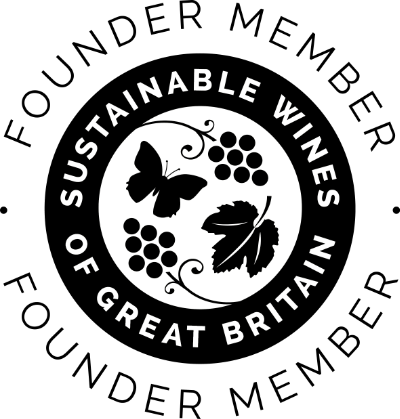Change happens at pace in English wine – as an industry, we’ve squeezed a lot into the past decade. The same can be said for Charlie Holland, the brilliant winemaker who, for just over 10 years, has helped shape Gusbourne’s future. As Charlie moves on to his next project with Jackson Family Wines, we ask him about his wine life so far and what he’s learned from his time at Gusbourne.
Playing the "Rizla" game got me into wine. I didn’t come from a wine background, but I wanted to travel. A friend got me a job doing the vintage in McLaren Vale. We hung out at this place called the Victory. The food was bog-standard counter stuff – but the guy who owned it was a proper wine nut. He had this amazing cellar downstairs, and we’d go and play the Rizla game. You had to guess what the wine was, the vintage, where it came from. To me, it was wild – these guys were nailing it. They could identify individual bottles. It blew me away. Wine was just so big, so complex, so interesting. I was hooked.
I’d always planned to come home and get a “proper job”. Which I did. But I couldn’t help thinking back to the vintage, and thinking what a great experience it was. It was bloody hard work – 12-hour shifts, I’d fall asleep in my dinner – but there was something about it. So I jacked-in my job and went back to university.
Then there was this one bottle of wine which made me realise what fine wine could do. It was cheap – it might have been a Cru Bourgeois – but it was about 30 years old. I remember opening it and just seeing the wine. It lived and died within the hour. Letting it breathe and the fresh fruit came through, then the tinned fruit – then this whole gamut of complexity – and then as we’re finishing the bottle, it was like seeing it in reverse until there was nothing left but alcohol and tannin. It was a beautiful thing; a real and intense experience. It made me realise there was more to fine wine.
Early on, I spent a lot of time out of my comfort zone. I did harvests in California and France, which were fun. I tried to get a job in Germany, but – even with a degree and three harvests under my belt – I couldn’t get a foot in the door. I worked for a while in the Rheingau, but the businesses there are handed down through generations, and I couldn’t get anywhere. So I came home, wondering if I’d wasted my time for all these years.
I owe a lot to Ridgeview. Mike Roberts taught me how to make sparkling wine. I was keen, I showed an interest and he and his family took me under his wing. I learned from them about the importance of detail, focus, control and… spreadsheets. Mike was a strong character and some people found him challenging. But he was good to me – he was supportive, and he listened.
You’ve got to keep challenging convention. You’ve got to keep moving. And you’ve got to tell me when things go wrong. That’s what it was like working with Andrew Weeber [Gusbourne’s founder]. We experimented a lot, and because he had this ethos of scientific endeavour he knew that a lot of experiments wouldn’t work. But his point was that if we didn’t experiment, we wouldn’t learn or move forward.
Be systematic, do your due diligence and work out the risks – then nothing is a waste of time. Even if the end result is a failure, if you’ve approached it in a scientific way, that’s OK.
Success is in the detail. Winemaking is a structured process, and so long as you follow the plan you’ll be OK. But you also need to think outside the box. They sound like contradictory ideas but, in reality, they work well together.
Winemaking is a blue-collar job but needs a white-collar education. Anyone can make wine because, at the end of the day, it’s just following a set of instructions. But unless you know why you’re doing it - what the implications are for the bigger picture - then you’re going to go wrong somewhere. Yes, you need to know the numbers, the analysis but then you have to bring in taste and style – and you can’t do that by data. Do you like it? Do I like it?
I’m always chasing a toasty character in my wines. I got quite obsessed with how to develop tasty, toasty sesame-seed flavours. Charles Heidsieck Blanc des Millenaires 1995 is my kind of wine. That’s the style I go after. I’m always thinking about where those flavours come from: the oak, the lees, the malolactic...
I always thought it would be the cold years that produced the best wines. High acid, low pH – wines that will go on forever. But what I learned was it was all about the health of the grapes. The ripest vintages: 2018, 2014, 2011, 2009 – you taste them years on and they are amazing.
Taste and think. It’s one of the most important bits of advice I’ve been given. Taste from the tank, right at the beginning of harvest. Taste the juice as it’s fermenting and try to work out what you’ve got. Encapsulate the vintage and what it’s going to be like. Work out how to use what you have – don’t try and fit a square peg in a round hole. Build on what you’ve got. Play to your strengths. Bring out the wine’s character and be flexible with your plan. If you come to each vintage with a recipe, you won’t make the best wine. You have to think: what’s it looking like? What’s good? What do we need to work on?
Understand your soils. This is the biggest thing I’ve come to realise over the years: everything we do should be about trying to understand what the soils give you and to accentuate it. Don’t try and shape a wine in a direction it doesn’t want to go – it won’t work. Gusbourne's got full wines – rich wines. So the trick is to bring out that muscle; build on it with the winemaking and oak.
Don’t get stuck in the bubble of English wine. We are working in a global setting – and that’s what I tried to teach the team at Gusbourne. We’re not making wines for ourselves, so it’s not about making zero dosage esoteric wines, or something that will please an acid freak – you have to make wines which are a balance.
Involve as many people as you can in winemaking decisions. I remember this right from the beginning of Gusbourne and the way Andrew and I worked. It’s partly about being inclusive, but it’s also about collective responsibility and keeping people invested and involved. We’ve done this. We’ve done that. This is our wine. If it’s a success, we share the glory.
We all have blind spots. This is as true of winemaking as anything else. So, I’ve learned to be humble when it comes to tasting. Tasting as a group is a joy. The team at Gusbourne are all dialled into the same flavours and we’ve often made the same assessments, but we have different opinions and we like different things. You’ll get a better, more balanced result when you listen to the different views.
As a winemaker, you’re a custodian. When I arrived here, I inherited wines made by several different people from vintages which I wasn’t involved in. I can’t take credit for these wines, but I had a role looking after them. Plus, they gave me an idea of what could be done here – especially with the still wines. Amazing Chardonnay and Pinot. It’s a responsibility to hand that same idea on.
The single-vineyard wines are really exciting. It’s a way of trying to understand exactly what Gusbourne has with its soil; then the team can learn more about the synergistic effect of putting it all together. It’s this kind of detail that really works for Gusbourne. Demonstrating what each of these sites can give you. Taste this, taste that – you can see the difference.
In the future, Gusbourne will have a monopole. In time, the team will really understand what they’ve got in each block. Which bit of the vineyard gets the last few rays of sun in the evening? What is the impact of terroir, aspect, elevation, shelter – all these elements that make a great site. It’s fascinating to me. There are so many moving parts. Then, once you understand the sites, you’ve got to work out how to use that data, to evolve your winemaking in the correct way.
Every vintage has its challenges, so don’t rest on your laurels. You never know what the next challenge around the corner will be. You’ve got to be on your toes and ready to react to it. Spot it early. Put a plan in place. Then nothing is insurmountable. You just need to be open-minded and cognisant that something could go wrong. Just try to think structurally, and systematically about the problem, and then what are your tools to solve it? And, in winemaking, it’s usually pretty obvious most of the time.
The biggest developments in the past decade have been brought about by people, not technology. The Gusbourne team bring insights with them from across the world – this is the way we did things in California, or this is how it worked in New Zealand. It’s a constant feed of thought-provoking opinion and insight.
Keep focusing on the detail. Keep evolving. There’s more work that can be done. I feel like I’m leaving just as Gusbourne is about to really fly. It’s in such a good place – the team, the vineyards, the winemaking. But it shouldn’t stand still; it has to keep evolving. Keep looking for the one-percenters which will make things better. Tweak, tweak, tweak. The wines I made in 2022 are not the same as those I made in 2013. Change shouldn’t happen overnight; it’s an evolution. And I’m excited to see how the team take things forward.
Luck plays its part. It's been an adventure for sure, with amazing people by my side. It’s been incredibly fulfilling, and I count myself hugely, hugely lucky to have been in the right place at the right time to take it on.
You may also like...









